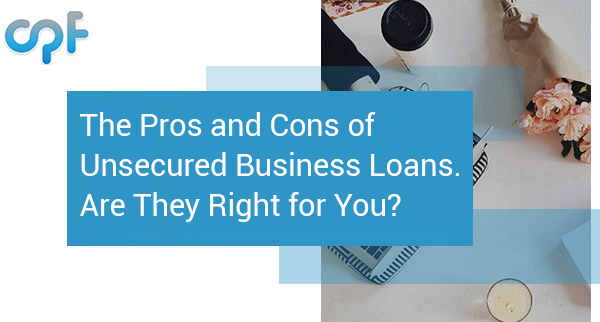When it comes to securing working capital for your small to medium enterprise (SME), there are a few options at your disposal. One of the most popular financing solutions for SMEs in the last decade has been unsecured business loans. Why? Once again, banks have dropped the ball and make it incredibly difficult to access funds as an SME. Most small businesses don’t have the assets to use as collateral for a secured loan and hence the appeal of an unsecured option for business owners in this situation is clear.
Unsecured business loans are available to most businesses, as long as they’ve been around the block (or made it at least halfway). If your business is generating revenue, non-bank business loan providers will assess your situation and provide a loan based on your current and projected cash flow. While not cheap, they may be an excellent option for your SME to get the cash you need to meet your outgoings, or to take advantage of growth opportunities as they present themselves. There are some very important pros and cons of unsecured business loans that you need to understand before making a decision. Let’s take a look!
The good
There’s a lot to love about unsecured business loans and the lenders that offer them. You just need to know where to look, what to watch out for and which lenders to avoid. The unsecured business loan industry certainly has a knack for marketing and selling a great deal, but you need to be vigilant when it comes to the nitty-gritty.
- Some non-bank lenders are leveraging technology to the point that that could be referred to as a fintech business rather than a lender. The beauty of this is that they have removed all the typical pain-points present when applying, and getting approved, for business funding.
“The application process can take less than 24 hours, meaning the cash will hit your account when you need it.”
- The process is super straightforward. Often all it takes is a quick call and a few minutes to upload necessary details (such as your ABN, banking details and identification). Unsecured business loan lenders look at your bank statements to assess your cash flow and ability to meet your repayments. Often this whole process can take less than 24 hours, meaning the cash will hit your account when you need it.
- The SME Loan Guarantee Scheme has opened another lifeline for SMEs. Under the Scheme, which has been extended until the 30th of June 2021, the government is guaranteeing 50 per cent of all new loans issued by eligible lenders to small to medium enterprises (SMEs). This guarantee covers up to $20 billion, supporting $40 billion in new funding. Eligible loans can be for up to $1 million and used for a range of purposes. They also may be repayment-free for a period at the discretion of the lender!
The bad
Unsecured business loans sometimes get a bad rap due to their relatively high costs when compared to their secured counterparts. It also doesn’t help when lenders try to get crafty and represent the cost of the funds in a way that may trick some people… let’s break it down.
- The cost of an unsecured loan is higher than a secured loan from a bank; there’s no way around it. Secured loans have the backing of a valuable asset, meaning that banks are willing to lend funds at a lower rate since their money is more likely to be recoverable if something goes wrong. Non-bank lenders are not banks and are relying entirely on your SMEs future cash flow. If you want fast, straightforward access to cash, you need to pay up for it.
- Lenders often present the cost of the loan as a total interest rate (based on simple interest) as opposed to an annual percentage rate (APR). Why is this an issue? They are often very different!
The advertised total interest rate is used to calculate the interest component of your loan and will always be lower than the equivalent APR. Firstly, the total interest rate may not represent the effective term of the loan. A ‘low’ rate for a short term loan may actually be relatively expensive. Furthermore, the standardised APR takes into account all the costs involved, such as insurance, application costs and service fees.
For example, a 8% simple interest rate for a twelve-month loan would actually be equivalent to a 14.45% APR (excluding all other fees). Essentially, presenting a total interest rate rather than the APR may lead prospects to believe the loan is cheaper than it really is. Interest rates may also be fixed or variable, so make sure to clarify if your repayments may vary or not throughout the length of the repayment period.
The verdict
Whether or not unsecured business loans are right for your SME or not is up to you. Find an expert business broker to help you assess your situation and help in the application process. Discuss the costs involved and ensure that you’re targeting a sufficient return from the funds to justify the process. Never approach every lender one by one, they’ll hit your credit profile and tank your credit score – that’s the last thing you need to cap off 2020! If an unsecured business loan is not for you, an option such as debtor finance may be a viable alternative.
Whether your SME is looking to access additional working capital for the holiday season, needs some new equipment or just wants to sure-up some cash flow; Capital Plus Finance is a business finance broker that has your best interests at heart. The team at Capital Plus Finance will do everything we can to help you secure a suitable finance solution for your small business. Please give us a call anytime to find out more or to have an obligation-free chat about your business’s funding situation.


